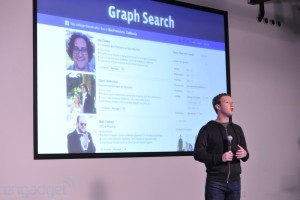Graph Search
Facebook CEO Mark Zuckerberg announced on Tuesday, January 15th “Graph Search” at a press event at Facebook headquarters in Menlo Park, California. Facebook, the worlds largest social network encompasses a user base of over 1 billion, photos toppling 240 billion, and over a trillion connections took the opportunity to take a monumental step forward, data entoe and introduce Graph Search.
Graph Search is a search tool intending to provide people the answers to their to their questions about people, photos, places, and interests. This allows users to search all of Facebook’s content for search results specifically tailored to your social profile based on your friends, photos, interests, and places.

Facebook Introduces Graph Search
The project was headed up by Lars Rasmussen, one of the chief workers in the WAVE application as well as Google Maps.
Graph Search is essentially a Facebook’s internal search engine, thereby allowing its users to have a new means of creating new relationships with people they may not otherwise meet, or do not know as well as they thought.
There are currently two ways to get information about people – the News Feed and the Timeline. According to Zuck, ” People want to know what is going on around in the world around you. That’s News Feed.” The Timeline helps you learn more specifically about a particular person.
The new way to find things is through search – Graph Search.
The Difference Between Graph Search and Web Search
“This is not web search”, emphasizes Mark Zuckerberg. Graph search shows private information that isn’t in web search. “Graph search is designed to return the answer, not links to an answer”, he says.
In a demo of Graph Search: Facebook is showing a list of “friends who like Star Wars and Harry Potter.” The list can also be narrowed down by school, hometown, gender, school, relationship and other factors using drop downs on the right hand side of the search results. The list of people also shows what other likes the people have and how they are connected to you.

Mark Zuckerberg Revealing Graph Search
The 4 Elements Of Graph Search
Traditional search engines like Google, Yahoo, and Bing return pages of search results based on the search term inputted by the user. Graph search will let you search for things “socially related.”
People
Graph Search allows users to search their friends, and even friends of friends based on paramaters inputted from the user. For example, you can search “friends of friends who are since women living in California” and get a list of people for the perfect matchmake. Don’t worry about privacy, Facebook insists you can only search for items/people that you could normally see on Facebook.
Photos
With Graph Search, one can simply search for “photos I like.” This brings in social gestures such as the “Like” that Facebook already has that tag photos and other objects.
Places
This is data that Facebook has that competitors don’t. You can only see the photos that people have shared with you. You can now search “photos of my friends taken in New York City” The searches bring up large photos of the photos in that category. This could potentially help advertisers properly target ads based on your photos, and the places you have visited.
Interest
Search “TV shows my friends like” or “Documentaries my friends like.” Clearly this section of search has revenue potential. The hope is that users will list all of their interests and people/friends can search those interests.
Facebook Introduces Partnership with Microsoft
Mark Zuckerberg also announced on January 15th, 2013 that the new Graph Search tool will integrate with Bing, the search engine headed up by Microsoft. Bing will bridge the gap that graph search leaves wide open. As integrating Bing means having the ability to pull data like current weather conditions, something your friends, photos, interests, and places cannot provide. Bing has been providing web search results on Facebook for sometime, but this announcement means this:

Facebook Declares War on Google





